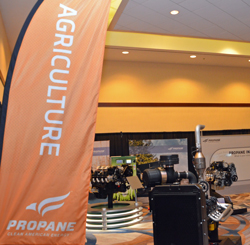A new line of GNSS and steering products are being touted as innovations that combine industry-leading precision farming displays with superior GNSS technology. Precision ag equipment provider Ag Leader Technology, Inc. announced a new line of GNSS receivers – GPS 6000, GPS 6500, RTK Relay and GPS 6500 base station – as well as the company’s latest automated steering controller, SteerCommand™.
“In developing our new GNSS products, we turned to NovAtel – the foremost manufacturer and innovator in GNSS technology – as our partner moving forward in this market,” said Matt Leinen, Product Manager. “We’re confident this relationship provides our customers with the best possible product combination available on the market.”
As a fully scalable, rugged Smart Antenna, the new GPS 6500 utilizes GLIDE, SBAS, TerraStar and RTK, and is designed to meet the need of extended RTK base lines in excess of 20 miles (32km).
 A full-featured, easy-to-install system, GPS 6500 with RTK Relay provides RTK correction. The GPS 6500 can be combined with one of four Relay offerings: Relay 900, Relay 400, Relay CDMA or Relay GSM. GPS 6500 with Relay 900 or Relay 400 also offers base station functionality, ideal for steering and other operations where sub-inch accuracy is needed.
A full-featured, easy-to-install system, GPS 6500 with RTK Relay provides RTK correction. The GPS 6500 can be combined with one of four Relay offerings: Relay 900, Relay 400, Relay CDMA or Relay GSM. GPS 6500 with Relay 900 or Relay 400 also offers base station functionality, ideal for steering and other operations where sub-inch accuracy is needed.
When uptime is valued over absolute accuracy, StableLoc™ utilizes available correction signals in order to provide a seamless transition between correction sources – without position jumps – and maximize signal uptime.
 “At Ag Leader, we endeavor to put out the best and most complete solution for our customers,” said Bill Cran, Product Specialist. “With our new GNSS products, we have an extremely flexible and powerful lineup capable of fulfilling any role within an operation.”For growers seeking an integrated steering system, Ag Leader’s SteerCommand offers best-in-class integrated steering performance when paired with GPS 6500 for repeatable, precision steering via RTK correction. The new SteerCommand controller features compact and flexible installation, as well as nine-axis terrain compensation for superior accuracy.
“At Ag Leader, we endeavor to put out the best and most complete solution for our customers,” said Bill Cran, Product Specialist. “With our new GNSS products, we have an extremely flexible and powerful lineup capable of fulfilling any role within an operation.”For growers seeking an integrated steering system, Ag Leader’s SteerCommand offers best-in-class integrated steering performance when paired with GPS 6500 for repeatable, precision steering via RTK correction. The new SteerCommand controller features compact and flexible installation, as well as nine-axis terrain compensation for superior accuracy.
More information on the complete line of company products is available at www.agleader.com.











